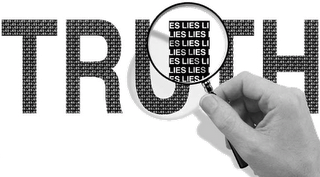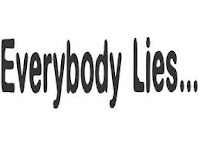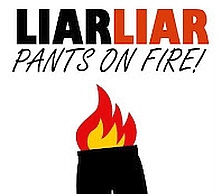Lying and The Empathic Truthsayer
- Details
- Written by AndEl

The Truthsayer
An interesting byproduct of being highly empathic seems to be that one can become a sort of truthsayer...or living lie detector. What this means is that the highly empathic person can easily discern whether or not a person is telling the truth or not and if they are dissembling in respect to motives, feelings and/or beliefs.
This byproduct, as it were, seems to be derived from the Empath's ability to read another person's emotions and emotional states. In other words, because a highly empathic person is well attuned toward sensing and feeling the overall emotional state of all of those around themselves, almost constantly, the person in question begins to develop a deeper interpersonal intelligence. Interpersonal intelligence is, by definition, the ability to interact with others, understand them, and interpret their behavior. Individuals who exhibit a level of interpersonal intelligence, have the particular ability to perceive the moods, temperaments, motivations and intentions of others.
This skill can becomes disconcerting, when those around us ~ even those we feel closest to, hide and/or deny their true feelings, intentions, motivations, and so forth, while offering up to the world something that is less than the truth with respect to those same things; intent, motivation, and real feelings. Then the Empathic Truthsayer, is conflicted because they see and recognize what lays beneath the surface persona a person wears for the outside world. When the surface persona and internal self are out of balance (when a person is struggling internally and putting on a strong and/or happy face to the world), the Empathic Truthsayer can see and recognize it.
In the quiz,What Kind of Empath Are You?, based onJad Alexander's work The Book Of Storms, he begins to categorize different types of Empaths, one being that of the Judge Empath. A Judge Empath is described like this:
You are a Judge Empath, one who is a "truthsayer". You can tell truth from lies, good from evil. You do not tolerate wrong doing. You are a defender of the good and the innocent. You are kind and merciful but do not play foolish games.

Everyone Lies
Before we continue on with our discussion about Empathic truthsayers, we must first understand what a lie is, some of the basic reasons behind lying, and the possible positive/negative intentions for lying.
What is a lie?
A lie is a false statement made with the deliberate intent to deceive. Everyone lies, whether we care to admit it or not. They come in many forms, from small white lies, which harm no one, to gargantuan ones, which affect many people at once. And just as lies can differ in size, so to can they differ in frequency, from once in a blue moon (a rareoccurrence) to the majority of the time.
Are there different types of lies?
There are many different forms of lies. Let's look at some of them:
- Blantant Lies- when someone gives false information
- White Lies- generally used with the intention to help someone else, even when the lie does nothing more than act as a placebo.
- Lies of Magnitude- exaggerations in the form of flattery or boasting, in which one makes something better than it actually is
- Lies of Misdirection- to mislead someone or bait them (often called a bluff in games of chance)
- Partial Truth- to not tell the whole truth
- Self-Deception- lying to ourselves through rationalization (to rationalize we are doing the 'right' thing, when in fact we are not)
- Potential Truths- saying something as if it were fact without foreknowledge of its veracity
- Jocose Lies- lies meant in jest, intended to be understood as such by all present parties.
- Noble Lie- a myth put forward by leaders in order to assure that each member of a society happily plays their part in creating a well-ordered and stable society.
What are some of the reasons people lie?
There are any number of reasons why people choose to lie, but all of those can be broken down into several very basic reasons:
- To enhance reputation
- To avoid punishment
- To cover up mistakes and bad behavior
- To avoid hurting someone or starting a fight with them
- To hurt another person's reputation
- To harm/attack other people indirectly
- To maintain relationships and please others
- To reassure the needlessly anxious
- To spare unnecessary headaches
- To gain control over a situation
What are the some of the advantages or more acceptable reasons for lying?
This question might seem out of place, because one might think there is absolutely no acceptable reason to tell a falsehood, but in understanding the reasons why people lie, we must understand the pros and cons of doing it at times.
- the truth can be hurtful
- helps avoid unnecessary conflict
- helps maintain a sense of privacy
What are the potentially negative results that can arise out of using deception and lying?
- destroys trust and creates distance
- limits choices
- and it's hard to contain
Are there tell tale signs that someone is lying?
- Expand contractions, stressing full-form verbs, such as "did not" and "could not," to convince people they're speaking the truth.
- Deny lying, making emphatic claims to be telling the truth, such as "I have no reason to lie."
- Pause and use nonword sounds during hesitations in their speech ("uh," "er" and "ah" are examples).
- Make speech errors and more frequent gaffes than people who speak the truth. Errors can include grammar, tense and losing thought in midsentence.
- Stutter, stammer and become tongue-tied.
- Clear their throats and make other noises.
- Use qualifiers and modifiers, explanatory words, such as "however," "sometimes" and "generally.
- Avert their gaze, trying to avoid eye contact.
- Close their hands/interlock their fingers.
- Cross their arms as if creating a barrier.
- Drink and swallow more often than those who tell the truth.
- Use fewer hand gestures, staying stiff, controlling the movements of their hands.
- Shrug their shoulders and flip their hands over in an "open" (palms up) fashion.
- Perform hand-to-face grooming, touching their face, ears and hair.
- Handle objects, such as pens, papers and eyeglasses.
- Blink less than people who tell the truth.
- Do less finger pointing.
- Lean and shift — leaning forward, resting their elbows on desktops or their knees. They also shift often when sitting.
- Lick their lips often.
- Pucker and tighten their lips.
- Sigh and take deep breaths.
- Smile more and laugh inappropriately.
- Touch, scratch and rub their nose frequently.

Truthsayers and The Confrontation of Lies
Now whether one can do this or not, is not going to be the issue of contention here. Instead let's focus on another issue, which pertains to this topic. When someone believes they are a living lie detector, often they also feel the need to be confrontational about these kinds of things.
Because of this constant feeling of being lied to, intentionally or unintentionally, resentment and aggravation toward others, in general, can accrue and cause people to forget things like personal boundaries, respect for others privacy, tolerance of others beliefs, and so on. Thus the person, who is an empathic truthsayer, can potentially become confrontational when faced with the imbalance of what is being said on the surface and what they are perceiving emotionally beneath the surface facade worn for the external world.
By far, this is not the only reason a truthsayer would act in an aggressive/confrontational way toward others. Some believe it is their duty, because they are in possession of this gift, to hold a mirror up to others, so that they are forced to face their truth head on. And this is done, whether the other party wants them to do this or not.
So, if you find you possess this ability, to discern when someone is dissembling, or not telling the whole truth, here are some suggestions to keep in mind.
- Respect personal boundaries- Remember that you are twoseparatepeople and healthy boundaries should be maintained for the overall health of both parties.
- Respect privacy- Just because you can detect lies, doesn't mean you have the right to bring another person's issues out into the open.
- Respect others beliefs- You don't have to like or agree with others beliefs. But you can offer them tolerance and respect by not making issue of them during a confrontation.
- Respect individuality- This one goes back to number one. Remember that you are two separate people with different beliefs, different feelings, different motivations, and different experiences.
- Empathy- Remember that the truth hurts. Imagine how you would feel if you were confronted with a truth that you did not want to face. If you know you would be hurt, imagine how the other party is going to feel if you do it.
- Right of Judgment- Ask yourself, what right you have to confront people with these 'truths' and to play judge, jury and executioner. Ask yourself what lays behind the driving need to be confrontational with others in such a way? And confront your own truth about this topic.
- Just because you can, doesn't necessarily mean you should.
Consider these things as you approach another person, in order to confront them with the truth. Think about them as you interact with the exterior world. We live side by side, and sometimes it is important to be confrontational. But sometimes, it is of equal importance to allow people to have their privacy, their secrets, and own unspoken thoughts and opinions.
In Balance
When the gift of discernment toward truth and lies is in balance, imagine what a rich picture it can paint for your perception...the depths it can take you to emotionally within a another person. Imagine the depth of understanding which can be developed and cultivated, when it is utilized appropriately and is not abused to feed a sense of ego.
Being able to read between the lines....see beneath the surface...are gifts which allow each of us to connect with one another at a much deeper emotional and spiritual level. It is a precious thing. Think about it.
Source Here
Liked this article? Dive deeper into personal growth and wellness! Check out CrystalWind.ca for spiritual wisdom or explore AromaWorx.ca for natural well-being tips. Spread the positivity—share this with friends on their happiness journey!
Let’s Chat! Drop Your Thoughts Below! ![]()
Latest Articles

Imagine a world of inspiration and healing, free for all—made possible by YOU!
Donate Now—Ignite the Magic at CrystalWind.ca!

Epilepsy - Finding A Cure
Your donation can make a difference!
Help us find a cure – donate now!
Unlock Your Light: Join Lightworkers Worldwide on CrystalWind.ca!
Follow Us!
Who is Online Now
We have 34988 guests and no members online
Featured This Month
Frogs Return Moon
Beaver – Chrysocolla - Blue Camas – Blue April 20 – May 20 The Frogs Retur... Read more
Litha - The Midsummer Solstice
The Litha festival is one of the lesser Sabbats of the Witches annual calend... Read more
Litha (Midsummer)
The season of Midsummer (also called "Litha") begins on or about June 21st i... Read more
Taurus Mythology
The Taurus Myth The story of Taurus is most vividly tied to the tale of Zeu... Read more
The Crystal Wind Oracle Card Deck
The Crystal Wind Oracle™ The Crystal Wind Oracle Myth & Magic Card D... Read more
Litha Sabbat - The Summer Solstice
Gardens are blooming, and summer is in full swing. Fire up the barbeque, turn ... Read more
The Seven Chakras and their Meanings
If you could imagine chakras as circles of energy, flowing all the way throu... Read more
Cartomancy - Fortune Telling Using Playing C…
Cartomancy is the act of divining using cards. Divining means to find out by... Read more
Sun in Taurus
Sun in Taurus April 21 through May 21 An Overview of Sun Sign Characteristi... Read more































































































































































